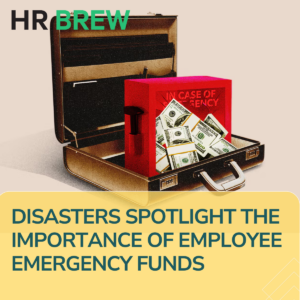A few weeks ago at a terrific event put on by Of Color, I had the good luck to hear Liz Davidson, CEO of Financial Finesse, answer this question,:
Are companies obligated to provide financial coaching for employees?
Financial Finesse has been providing employee financial well-being solutions in the workplace since 1999, well before most employers and benefits providers were thinking about this. So, her answer is especially interesting.
She said that she used to answer by saying “it’s not an obligation, but it is in your best interest.” If you’re reading this, you may know this data:
- Employees who are under financial stress are 5x less productive.
- They make far more healthcare claims (19% more by Financial Finesse’s count).
- Solving for financial stress leads to greater retention and engagement, with more than 70% of workers saying that they are more likely to stay with a job that offers employee financial health programs – even if they do not access them!
- And, last but certainly not least, financial stress creates meaningful human, legal and financial risk. This recent research regarding the marked increase in preventable accidents when truck drivers experience financial stress drives this point home.
But what was really interesting to me is that she said that, now, she answers that question differently. She says “ it is not only in your best interest, it is also your obligation.”
So, why is that? Why should employers support the financial wellness of their employees in ways that reach beyond wages, health insurance and retirement benefits?

It is because the nature of work, and the nature of people’s financial lives, have both changed. In the era immediately post-World War II, many workers earned an income that allowed a single earner to support a family. In addition, companies paid the majority of healthcare costs and they often provided pensions that delivered a lifetime income for retirees.
Today, that is simply not the case for most people and most companies. The norm for American families now is to rely on two (or sometimes more) jobs to provide sufficient income to pay the bills. Most people pay significant amounts toward their health insurance premiums, and they often have large deductibles. 401(k) plans have replaced pensions, which means that financial security in retirement requires individuals to save and invest over many decades. These changes mean that financial lives have gotten far more complicated, with far more risk. So, far more knowledge and planning is required to navigate through the normal ups and downs of life.
Liz’s argument is that because these changes are the result of changes in employers’ policies, employers now have a responsibility to provide the tools that enable individuals to navigate them. Financial advice, provided in the workplace, has become a Need to Do, not a Nice to Do.

I couldn’t agree more strongly with Liz. I’d also go a step further. In addition to advice, what workers need and deserve from their employer is a backstop that kicks in during moments of crisis. That is because the ups and downs of life are even more nuanced than these big picture trends explain. In The Financial Diaries, Jonathan Morduch and I shared what we learned through deep analysis of the financial lives of 325 families in the United States for a full year. A key finding of our research was that many workers experience meaningful volatility in their finances from week to week, or month to month. For the families in our study (largely hourly workers with earnings at or below the median income in their neighborhoods), earnings were at least 25% higher or 25% lower than their average earnings in five of the twelve months of the year.
This volatility connects to the fact that many people experience economic shocks each year that are difficult or impossible for them to manage on their own. The Pew Charitable Research Trust found that over half of Americans experience a shock each year, and among those, half are still dealing with the repercussions a year later. Things like a car accident, a major medical event, a death in the family … these become more than momentary financial disruptions. These emergencies can:
- impact a workers overall well-being – PwC’s 2023 Employee Financial Wellness Survey found that money worries have had a negative impact on employees sleep, mental health, self-esteem, physical health, and relationships at home.
- derail an individual’s ability to afford basic necessities, like food, housing, and utilities. Our 2021 Impact Report explores this as it looks at employee relief fund usage and asks the question, “Why do people ask for help, and how do they use the money?”
- create stress and worry that seeps into every aspect of their life, even impacting their productivity at work. As a recent SoFi at Work study found, financially stressed workers spend 9+ hours at work dealing with financial issues.

This financial safety net is exactly what Canary exists to provide. Born out of my research, Canary was built to power fast, dignified emergency grants to employees in crisis. We give people another trusted place to turn when life (and finances) get tough. To do this, we help employers to establish charitable funds that support employees when they experience an unavoidable, unexpected emergency that makes it hard for them to afford basic living expenses. The changes referenced above – reliance on multiple streams of income, 401k’s replacing pensions, hefty health insurance premiums and deductibles – in tandem with the regular, inevitable spikes and dips of an individual’s finances, all point to an answer that goes beyond financial education. I argue education without additional guardrails to protect workers, especially through uncertain economic times, is only a half-measure. Employers should support the near-term financial well-being of their teams to keep pace with everything life throws at them.
To learn more about supporting your employees through financial hardships, reach out to our team today.
Download our most recent Impact Report to learn how employee relief funds support modern, diverse workforces in uncertain times.






